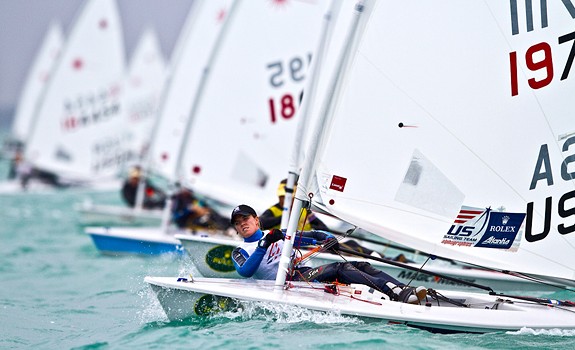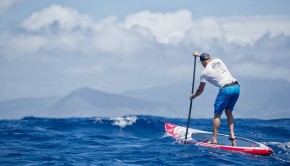Paige Railey – Performing while having to be conservative
Published on February 2nd, 2011
 American Paige Railey was the first North American to win the women’s ISAF World Sailor of the Year Award, and she did it in 2006 when only 19 years old. I have interviewed Paige several times by email or phone, and finally got the chance to meet her in person prior to the Rolex Miami OCR. Each time we chat, I tease about her propensity for OCS and Rule 42 (propulsion) penalties, but commended her this time on how that seemed to be behind her.
American Paige Railey was the first North American to win the women’s ISAF World Sailor of the Year Award, and she did it in 2006 when only 19 years old. I have interviewed Paige several times by email or phone, and finally got the chance to meet her in person prior to the Rolex Miami OCR. Each time we chat, I tease about her propensity for OCS and Rule 42 (propulsion) penalties, but commended her this time on how that seemed to be behind her.
But when I made the comment, I forgot to knock on wood. And of course, after the first day of the Rolex Miami OCR, Paige had a 1-OCS. I felt horrible, and apologized by email about jinxing her. She quickly wrote back that night: “LOL! It’s really okay. I tried to prevent it. It was purely a mistake, not like before where it was just pure stupidity! Now I’m focusing on one of my biggest goals: Performing while having to be conservative.”
What happened next was, from my seat in the stands, very impressive. Paige competed for five more days, and nine more races, never finishing below 6th in the 58-boat world caliber fleet, and ended up winning by 23 points. After the regatta I wrote to her, “So glad that my jinx did not derail your regatta. Can you explain how your approach allowed you to be both conservative and successful? I mean, being both decisive and conservative can be odd bedfellows.” Here is Paige’s reply:
“Being conservative and successful is very difficult. I had to choose my moments on when to take risk and when not to. One area that I had to play it safe was on the starting line and yellow flags (for Rule 42 violations). I was not allowed to get anymore DSQ’s. This means that if I have to have a less than ideal start or let a boat pass me on the downwind, then I must let it happen.
“I had many starts that were not very good, but it forced me to rely heavily on other aspects of my sailing such as tactics and strategy on the upwind legs. I had to out-think the other sailors by being smart, not by being risky and banging a corner.
“After my OCS I told myself that I had to drop the thought of being first to a windward mark or having amazing starts. I instead was going to have average starts and windward mark roundings, but was going to have to fight my way around the whole course to pass boats by being smarter than them…not faster because I could push my boat kinetically harder. This was a great learning experience for me because it really forced me to open up my mind to many different tactical situations on where I had to make crucial decisions. It also taught me to hold back on intense moments where I would usually react.
“For example, in the medal race I was winning, but I let a boat pass me because I was not going to push too hard on the downwind. A second example deals with the many starts that I was about a boat length back from the fleet. It taught me how to keep my height, but foot at the correct moments so I wouldn’t be rolled. The last situation where I noticed a difference dealt with the tactics on the upwind. There were many times when I knew a side would pay, but instead of banging it with the rest of the fleet, I would tack in a bit earlier than the others just to make sure I could make the cross back to the middle of the course.
“There were many times where I rounded 8th rather than 1st because I made more conservative decisions, but never giving up around the course enabled me to win.”









 We’ll keep your information safe.
We’ll keep your information safe.